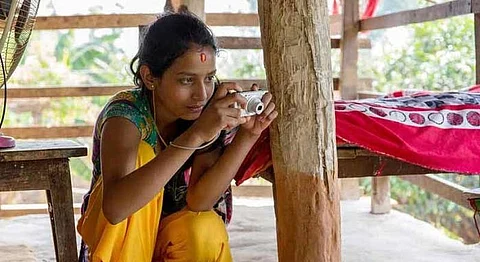
- HOMEGROWN WORLD
- #HGCREATORS
- #HGEXPLORE
- #HGVOICES
- #HGSHOP
- CAREERS
- ABOUT US
- CONTACT US

“The soul screams
The hearts shatter during menstruation
We share our sadness here”
These were the words chanted by about five to six women cramped in a tiny hut with leaking roofs and cold wind blowing through the thin hay exteriors in Western Nepal. A tradition popularly followed during menstruation for all the wrong reasons, called ‘Chaupadi’ .
India has always been ahead of the game in terms of irrational myths and superstitions regarding menstruation. Girls in villages are uninformed about healthy habits to follow and seventy percent of women in the country still don’t use sanitary pads. Popular taboos such as avoiding contact with other family members, sleeping separately, staying miles away from jars of pickles and eating in isolation still exist to name a few. IPSOS a global market research company found that these were taboos prevalent in urban areas even today. If we claim to be educated, rational and open minded ,why do we shy away from even watching a commercial about sanitary pads with family members? It’s the kind of thought that has been gathering more and more steam over the last few years, but it’s certainly not an issue we’re alone in perpetuating.
Predominantly observed in our neighbouring country, western Nepal is at the forefront of these menstrual taboos. Here, women’s monthly bleeding cycles are often considered filthy, impure and also a bad omen. Injudicious myths such as ‘if a women enters the village on her period,someone may die’ or ‘The animals anyway create enough filth, we can’t have the women add to that too,’ are common mindsets and the men of Western Nepal don’t understand the psychological consequences of isolating young girls when they are going through this phase. Unaware about the protocols involved during menstruation she only has those women to empathize with. They are even banned from eating meats, dairy, fruits and vegetables as it could cause a curse to future produce according to the villagers.
Thankfully, several individuals and NGOs have taken it upon themselves to bust such myths through innovative campaigns and initiatives, something we covered in extensive detail in this article.
This year, WaterAid, an international charity that transforms lives by improving access to safe water, hygiene and sanitation conducted an equally powerful campaign in a village Sindhuli about 135 km away from Kathmandu that caught our eye instantly. With the prime motive of spreading awareness, they brought to light the state of melancholia girls go through when on their period. Girls were given cameras for the first time and were told to capture all those things they had to refrain from looking at or touching when it was ‘that time of the month’ and the various stigmas that still exist around it. This visual medium was their way of giving them a voice.
Barbara Frost, WaterAid’s chief executive shared the charities motivations to conduct the project. “The silence and stigma that surround menstruation impinges on girls’ everyday lives. Furthermore, when there are no safe, private toilets in schools, girls often skip school during their period, or drop out of school altogether once they reach adolescence. With nowhere hygienic to clean sanitary pads or wash, women and girls also risk infection,” she explains. “Being able to deal with periods in a hygienic and dignified way is crucial to women’s well being. It helps women feel that they are able to play a full role in society, no matter what time of the month.”
The Nepal Supreme Court banned ‘Chaupadi’ in 2005 but it still has not been banished from the customs and minds of the dwellers of this village.
The girls in Sindhuli had never used cameras before, but that didn’t stop them capturing life in isolation.
Girls aren’t allowed to comb their hair or look inside the mirror.
Captured by Rabina (15) the picture shows her grandmother making leaf plates that girls aren’t allowed to eat in during their periods.
Bandana Khadka, 15: “This is my mother and sister in the picture. Here, my mother is feeding my sister with so much of love. Mother loves me very much as well. However, during my menstruation cycle I am kept separately and have to eat at distance. When nobody touches me, I feel unloved. We need lots of love and support during our menstruation but, when I am separated and treated like an untouchable I feel no love from my mother and father and I feel only hatred. I feel sad being treated that way.”
Sushma Diyali,15: “This is the girl’s toilet of our school. We are in urgent need of MHM friendly toilet. The one we use doesn’t lock properly. If someone is inside, other person has to wait outside pushing the door for her. Because of lack of latrines in our school, we have to wait in the long line. This is very problematic for us and we are need of more girls’ friendly latrines.”
Bisheshta Bhandari, 15: “The place featured in the picture is the place where I used to wash myself during my first menstruation. My sister Shristi is washing her face in this picture. When I had my first menstruation, I stayed at another’s house, as we were not allowed to stay in our own house. The house where I stayed during my first menstruation is 15 minutes away from my own house. We teenage girls are more secure with our own parents, be it during menstruation or not. Moreover during menstruation, we need extra care and support from our parents. When we have to stay out of home in some other house for seven days, we may not be secure. Therefore any adolescent girls need to stay with their parents to be safe and secure.”
